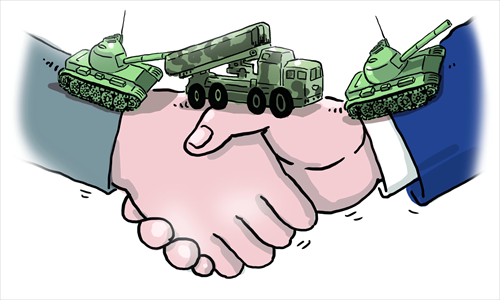Liberalizing defense sector enhances Indo-US relations

Illustration: Liu Rui/GT
A spate of high-profile visits from the US following Narendra Modi's ascent as India's prime minister has brought Indo-US relations to the forefront. The defense sector emerged as the key instrument of a possible turnaround in Indo-US relations, after US Defense Secretary Chuck Hagel's recent visit to India, following Secretary of State John Kerry's trip a week earlier.
The defense sector in India has traditionally been dominated by the public sector. But it has fallen behind technologically, and as a result, India has to import 70 percent of its defense requirements.
This leads to a widening of India's trade deficit and puts a strain on its capital account. Much of this can be changed with a simple measure to allow foreign direct investment (FDI) in the sector.
This will allow technology spillovers, leading to capacity-building in the domestic industry, which in turn can create more jobs.
A huge part of the unease toward this much needed reform has always had to do with the fact that the defense sector is considered a reflection of sovereignty, and as a result one that is best facilitated by home-grown and particularly public investments.
But the new government in India, which is committed to reforms, has undone this policy, allowing up to 49 percent FDI in the defense sector, up to 74 percent FDI in cases of state-of-art technology transfers, and even up to 100 percent if the CEO is Indian.
But in all of this, there is a crucial geopolitical story lurking. The US boasts the world's most advanced defense industry. Many of its firms are actively seeking out investment opportunities worldwide. With the US' capacities and India's demand for quality defense investment, the match seems obvious, and one that has huge potential, if exploited the right way.
While the previously allowed 26 percent FDI in defense had attracted foreign manufacturers to India, there is still a lack of flow of any credible technology and capital into the country. Indian defense is still public sector dominated as most contracts are given in favor of defense public sector undertakings (DPSUs).
The private sector has largely taken the joint venture route so far. Private sector participation has been constrained due to the fact that the nominated recipient in deals is mostly a DPSU, even if a private sector company is better placed in terms of infrastructure and knowledge to absorb the technology. Procedural issues are also a constraint.
But with this new policy, something big is potentially on the cards. Hagel has already indicated that military ties are poised to increase, and so an expansion of its ambit is also warranted. What's more, Modi has told Hagel that India would be interested in working with US defense companies to jointly develop and cooperate on co-production models. This is part of Delhi's efforts to achieve self-reliance while reducing arms import dependence.
While US defense firms are not as keen as India would like them to be, primarily because the FDI cap still remains below 51 percent, the increase in the ceiling from 26 percent to 49 percent nonetheless signals that further liberalization is on the cards. US companies know this, and the business community has by and large welcomed the step. The lobby groups will be hard at work trying to convince the Modi government to further liberalize the sector soon.
The defense cap in India will entirely disappear; it is only a matter of when. But there's plenty happening in the meantime. As a Boeing representative said earlier this year, even a 49 percent cap will see more US investment in the Indian defense manufacturing sector. India's defense acquisitions from the US crossed over $10 billion recently, and the scope for cooperation depends on the simplification of policies related to technology transfer with mutual interests in mind.
Since the defense sector was first opened up to private investment 13 years ago, barely $5 million worth of FDI has flown into the sector. But with the unambiguous affirmation that the government's interest lies in expanding indigenous capabilities, US firms are more than likely to respond to the reforms, and Modi's visit to Washington next month can be expected to cement ties.
The joint statement from Modi and his US counterpart Barack Obama will be watched the world over, and the likes of Lockheed Martin and Boeing will take special note.
Abhirup Bhunia, senior research analyst at the Institute of Economic Growth, New Delhi. Pravakar Sahoo, associate professor at the Institute of Economic Growth, New Delhi. opinion@globaltimes.com.cn